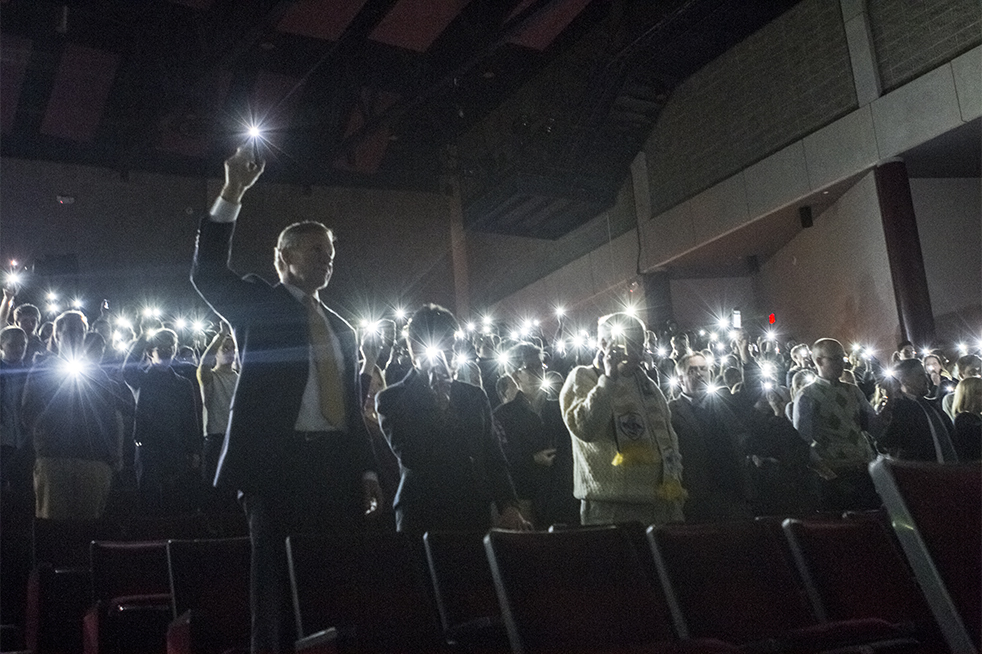A conversation began at Tech this week about mental health and suicide prevention after the tragic death of a Tech undergraduate student last Monday.
The Tech community gathered on Tuesday for a candelight vigil in the Ferst Center. Because the venue was changed to be indoors, students, faculty and staff used their cellphones as makeshift candles.
At the Mental Health Town Hall held Tuesday after the vigil, Dean of Students and Interim Vice President of Student Affairs John Stein discussed suicides at Tech. There is, on average about one suicide at Tech every year. According to Stein typically these occur off campus which is why they are less visible to the public.
One of the most frequent complaints, both on social media and at the town hall was the wait time for the counseling center. In a resolution still under revision, the Student Government Association (SGA) stated that the “capacity at the Counseling Center and Stamps Psychiatry cannot accommodate [the] demand, resulting in wait times that are too long for students who may be a danger to themselves.” This sentiment was shared by several students at the town hall.
According to Dr. Lacy Currie, a Counselor and Suicide Prevention and Crisis Response Coordinator, the typical wait time between a student first walking into the counseling center and having their first meeting with a counselor is between two days and two weeks depending on how busy the center is. Both Currie and Stein emphasized, however, that students who were in crisis would be seen immediately by the counseling center.
“I don’t want you to leave this meeting thinking students in crisis that we know about don’t get immediate help,” Stein said at the town hall. “They do.”
Another problem was the time between the first and the second meeting.
“We’ve talked with [Dean] Stein, and he’s looking at the staffing and the wait times,” said President G.P. “Bud” Peterson. “It looks like … there’s not a big issue with the initial visit, but the time from the initial visit to the second visit looks like it’s longer than it should be, so he’s reviewing that and evaluating that.”
According to Currie, the Counseling Center this year filled four vacant counselor positions and added two additional positions. In addition, according to Peterson, two more positions will be created in the Counseling Center to bring Tech to the national collegiate average student-to-counselor ratio.
According to Currie, a major problem that campus psychologists face is that many college students who commit suicide do not seek help.
“What we know [from] national statistics … generally speaking, only 20% of clients who die by suicide on college campuses ever come into [a] counseling center,” Currie said. “So what that says is 80 percent of the students who die by suicide on college campuses never come into [a counseling center].”
According to Currie, one of the Counseling Center’s big initiatives is training more people in their “QPR” training.
“It’s Question, Persuade Refer,” Currie said. “And as I said, it was created by a psychologist and it’s a nationally used program and what it is designed to do is to teach people how to recognize the warning signs.”
Another problem discussed at the town hall was academic stress faced by Tech students.
“One of the things we know that’s unique to Georgia Tech as compared to other [universities] is that the academic stress here at Georgia Tech is somewhat higher than in general, which is in some ways not surprising,” said Dr. Ruperto Perez, Director of the Counseling Center at the town hall.
The draft SGA resolution specifically mentions this point saying that “the administration, especially the Office of the Provost, must recognize that core cause of stress is not strictly due to academic rigor but is also a result of an imbalance in the power dynamic between students and faculty that allows faculty to take advantage of the current grievance system.”
At the end of the town hall, an anonymous question was read by Undergraduate House of Representatives (UHR) Speaker of the House Andrew Block which asked whether the administration should be more transparent about the mental health problem by releasing statistics on the number of suicides by Tech Students.
Stein responded by sharing the statistics from the last seven years and emphasizing that Tech had to be very careful when sharing that kind of information.
“It’s not that we’re hiding them, we don’t publish the numbers, but we don’t hide the numbers either,” Stein said.
Another question brought up was the medical withdrawal process that some universities such as MIT have for students facing acute mental health problems. According to Stein, the University System of Georgia does not have a medical withdrawal process. Students can withdraw for medical reasons, but to leave after drop day, a student must petition the Undergraduate Curriculum Committee.
Campus culture towards mental illness was also brought up. Some were discouraged by how often students undermine each other in terms of “Tech culture,” by for example bragging about how little sleep they got. Peterson, however, was optimistic.
“One of the things that impresses me about Georgia Tech is that students have undertaken this initiative, [such as] the videos with the Wreckless Club,” Peterson said. “The proactive approach that they’ve taken is really helpful, the idea that students need to take care of each other.”
After meeting with organizations around campus to get their input, SGA will vote on the mental health resolution.
